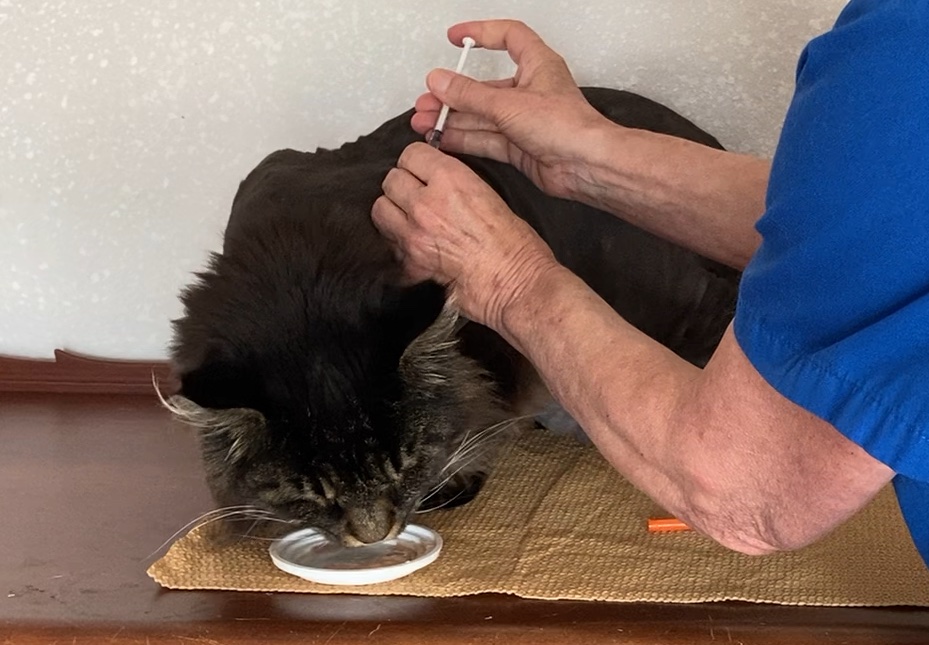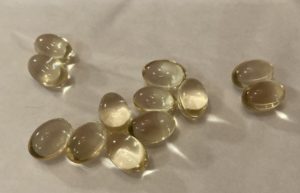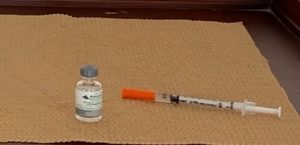
It is thought that almost 40% of all cats have clinical signs of arthritis and 90% of cats over age 12 have damage to the joints that you can see on x-rays. Cats are such masters at hiding pain that we are now thinking that arthritis is there earlier, pain is happening and we may not be able to see it on x-rays yet.
What if we could be proactive and start some kind of treatment before our cats even seem painful? Could we slow the deterioration of the joints? What arthritis supplements for cats are available and do they work?
The motivation behind writing this post was to help my youngest cat, 5 year old Gus, who showed some indications of spinal arthritis in his x-rays. Should I begin a supplement with him? I was astounded by the sheer numbers of arthritis supplements for cats on the market and the astounding claims they made.
arthritis supplements for cats – do they work?
Arthritis supplements for cats on the market now range from supplements used by humans to homeopathic remedies. Clinical trials are rare to non-existent on many of these products. This post addresses the more common products and ones that have had some double-blinded clinical studies done.
- glucosamine/chondroitin,
- omega fatty acids/ green lipped mussel extract
- polysulfated glycosaminoglycans
Glucosamine/chondroitin
Glucosamine occurs naturally in cartilage, the flexible connective tissue found throughout the body – for example, in the external ears and the surfaces of joints. The supplement can be made synthetically in the lab or harvested from the shells of shellfish.
Some human studies have shown oral glucosamine may help with pain relief and slowing of joint degeneration in people suffering from osteoarthritis. However, in general, the results from these studies are not conclusive.
Dasuquin is a commercially available formulation of glucosamine/chondroitin for cats. It is a dietary supplement in a capsule that is sprinkled on food. The product has been evaluated for safety.
A recent double-blinded study of Dasuquin enrolled 59 cats with Degenerative Joint Disease.
- All 59 cats were given a placebo for 2 weeks.
- Then 29 cats received the supplement for 6 weeks while another 30 continued to receive the placebo.
- The cats were evaluated by using an at-home accelerometer (like a kitty “fit bit”), owner observations and vet exams through out the study.
- The study showed a strong placebo effect – 78% of the cats were more active while on the placebo.
- Cats on the supplement did not show any statistically significant improvement over cats on the placebo.
However, the study did raise some questions:
- The “kitty fit-bits” showed that the least active cats at the start of the study became more active on the supplement. Were these cat more painful to begin with?
- The placebo was given in the first two weeks of the study when owner enthusiasm would have understandably been highest and owners would have been looking for improvement.
More research is needed – perhaps a different study design?
Omega Fatty acids (fish oils)
 Supplementation with fish oils has shown some benefit for arthritic cats. A double-blinded study showed that cats supplemented with fish oil for 10 weeks were more active, going up and down the stairs more, jumping higher, not walking as stiffly and were more interactive with their people. This study used owner evaluation to assess the cats’ improvement.
Supplementation with fish oils has shown some benefit for arthritic cats. A double-blinded study showed that cats supplemented with fish oil for 10 weeks were more active, going up and down the stairs more, jumping higher, not walking as stiffly and were more interactive with their people. This study used owner evaluation to assess the cats’ improvement.
Fish oil can be given as a dietary supplement (Welactin) or fed as a therapeutic diet, such as Hill’s j/d.
Side effects of fatty acid supplementation include GI upset and reduced blood clotting. There is some controversy over how much fish oil is enough. Additionally, fish oil can add quite a bit of calories to your cat’s diet and could result in weight gain, taxing your cat’s joints further.
Merial’s Antinol for Cats supplement is based on fatty acids from green-lipped mussel extract. There are a number of case studies where the supplement has been given to cats with good results for cardiac and dermatological issues, in addition to joint and mobility problems.
Polysulfated Glycosaminoglycans (PSGAGs)
This product is available under the brand name Adequan. It is the veterinary version of Arteparon, used in humans.

- Decreases the breakdown in cartilage. The PSGAG’s allows the cartilage to hold more water, making it resistant to degradation.
- Adequan has been extensively studied in dogs and horses for over 20 years and is FDA-approved for these species
- Available by prescription.
- Given by subcutaneous injection in cats with generally good results.
The jury is still out on most of the arthritis supplements for cats. Given at the manufacturer’s recommended dose, these products are safe and may be effective. Considering the individual nature of pain, some cats may respond favorably while others do not. Once again supplements are basically unapproved drugs so there is not the rigorous evaluation that accompanies FDA approval.
Your vet is your best resource on arthritis supplements for cats. He or she will be able to recommend a supplement or diet that is appropriate for your cat and is compatible with other medications or medical conditions your cat may have. In particular, combining supplements should be done with care – glucosamine, fatty acids and Adequan all effect how your cat’s blood clots.
So, what will I do for Gus?
My vets recommended the Adequan injection, citing the robustness of the canine studies and the fact that it is an injection – there is a greater confidence that the cat will get the supplement. We are not depending on him to eat something.
Want to keep up with the world of cats? Subscribe to The Feline Purrspective!


Ann Boyle says:
Phyllis:
This was an extremely interesting and honest article. I have used Adequan on one of my horses but found that it did nothing. For my horses, it was given intravenously and that is beyond my abilities. Hence it involved having the vet there regularly which really added up. It sounds like there is no magic cure for arthritis in cats. However, it also sounds like a work in progress. I look forward to hearing more about it as research progresses.
Ann
Marion Baker says:
Good article ??
Bruce Graham from Poshpawcare says:
Thanks for such an informative post! It’s great to see a clear breakdown of arthritis supplements and how they might help our cats. I didn’t know much about Adequan before, but the injection route makes so much sense—especially for picky eaters.
This definitely gives me some ideas to discuss with my vet for my senior cat. Appreciate you sharing your experience with Gus—it’s super helpful for fellow cat owners!